StressDrive
DO YOU FEEL UNDER PRESSURE?
Do we really understand stress, what it looks and feels like? Or how we cope with stress and what it does to our bodies?
.
When you talk to scientists and those folks in white coats, they say there are 3 types of stress; acute, episodic and chronic. It seems to us all these words are extremely difficult to define and certainly hard to measure, so how does a person know which category they fit into and how mild or strong are their feelings. In this modern world we love to label things because it’s easier and we can all rush out and say I have this syndrome or that ailment.
It seems arbitrary to have just 3 types of stress - why not 6? Also why not have a scale from positive to negative and design a scale - say from 1 to 6? Is stress internally developed or externally driven? Is short term stress an issue and what are the effects of long-term stress? All these things should be considered, and we attempt here to go through these issues.
Click on a heading below and see a summary, and if you're interested you can GO and read more about it
Here are some initial thoughts about stress. GO!
Here are some initial thoughts about stress. GO!
See what causes stress. GO!
See why women are more likely to experience physical symptoms of stress. GO!
See what the main elements of stress are. GO!
See what other types of stress there are. GO!
See what impact stress has on our bodies. GO!
See what we can do to control stress. GO!
See whether it’s all in the mind or affected by the body. GO!
See whether you can stay above it all – until someone p&^%ses you off! GO!
See how we can take control of our brains. GO!
If you’re a visitor to our site you can join and download information, assess your own health and create your own action plans, and even contribute to our site. GO!
See what you can do next. GO!
We have some additional information and stuff on this subject. GO!
Some Initial Thoughts
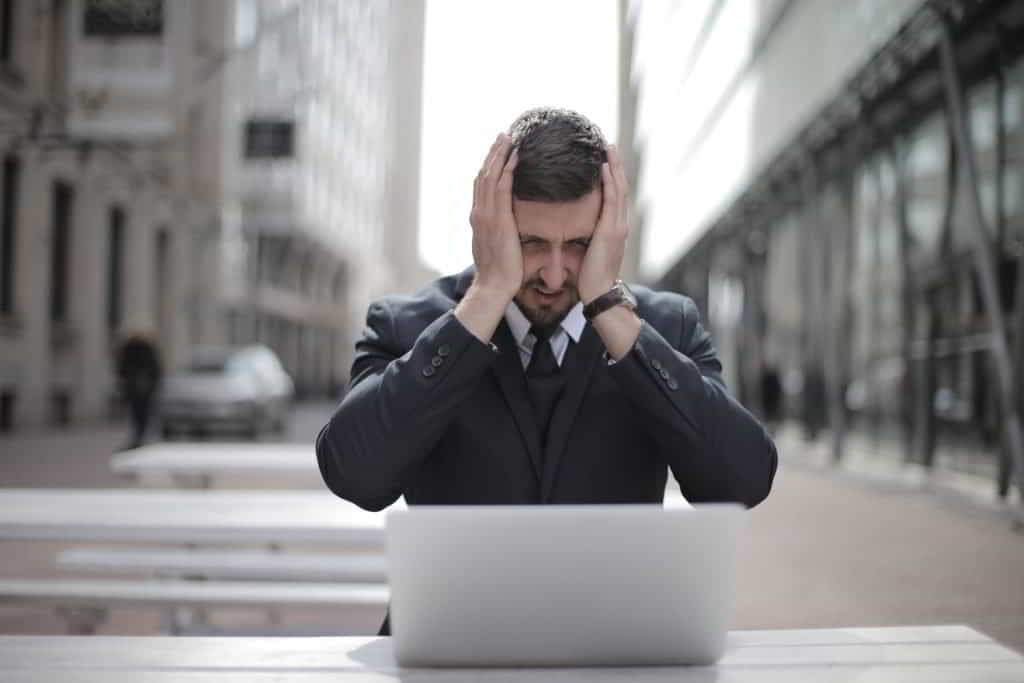
Physically
Stress is naturally created in the body as a result of a series of external factors. The hypothalamus, a collection of nuclei that connects the brain and the endocrine system, signals the pituitary gland to produce a hormone, which in turn signals the adrenal glands, located above the kidneys, to increase the production of cortisol. If this happens for a reason there is no problem. Some people are clearly more prone to stress whilst others seem to absorb it easier.
Often stress is hidden and comes on slowly. Things happen – perhaps something goes wrong – and this builds up and as each item is added we start to struggle to deal with them. People handle stress and anxiety differently. Some people get nervous over the slightest thing whilst others seem to be able to cope with huge amounts of pressure and load. In fact, some see stress and pressure as a bit like feeling powerful like a bodybuilder: "I am strong and can cope with this." Often this is totally wrong as the long-term effects can creep up on us and have a massive impact on other parts of our body.
In this Drive we look at stress as a natural bodily function. In some aspects, stress is natural but too much stress is bad for us. We show you the signs of stress, how to deal with it and control it, how to feel calmer and how to get help and support.
Facts About Stress
822,000 people off sick with stress which is 3% of the total workforce in 2021
In 2020, of British adults in employment – a staggering 79% commonly experience work-related stress. This is 20% higher than 2018’s findings (perkbox)
3140 per 100,000 population of public sector are off sick with stress in comparison to private which is 1780 in 2021
Work stress was a primary cause of stress and the second most common cause of stress (60%), with ‘family stress’ coming third place (48%)
Women under 35 were the highest stress groups with 3,570 per 100,000 population in comparison to men 2250 per 100k
40% of work stress cases said the number one cause of stress was work-related office politics.
70 million work days are lost each year due to mental health issues costing employers £2.4 billion
74% of people have felt so stressed they have been overwhelmed or unable to cope in the last year.
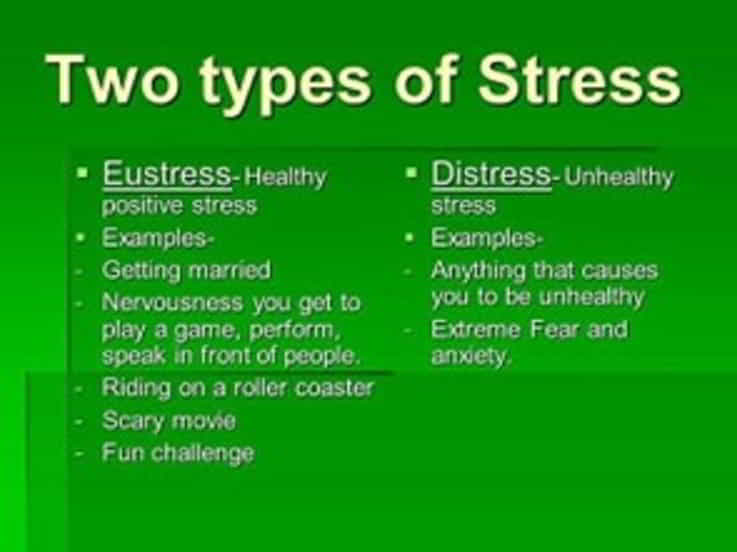
Stress is a hormonal response from the body
This response all starts with a part of your brain called the hypothalamus. When you’re stressed, the hypothalamus sends signals throughout your nervous system and to your kidneys. This has the reaction to activate the stress hormones.
These stress hormones are the same ones that trigger your body’s “fight or flight” response - your heart races, your breath quickens, and your muscles ready for action. This response was designed to protect your body in an emergency by preparing you to react quickly.
But when the stress response keeps firing, day after day, it could put your health at serious risk.

Women appear more prone to stress than men
Women are more likely to experience more physical signs of stressed compared to their male counterparts.:
This doesn’t mean that men don’t experience stress. Instead, men are more likely to try to escape from the stress and not exhibit any signs...
Women are more likely than men (28 percent vs. 20 percent) to report having a great deal of stress (8, 9 or 10 on a 10-point scale).
Men and women tend to react differently with stress–both psychologically and biologically. There is a clear pattern for the sex-specific prevalence rates of various mental and physical disorders.
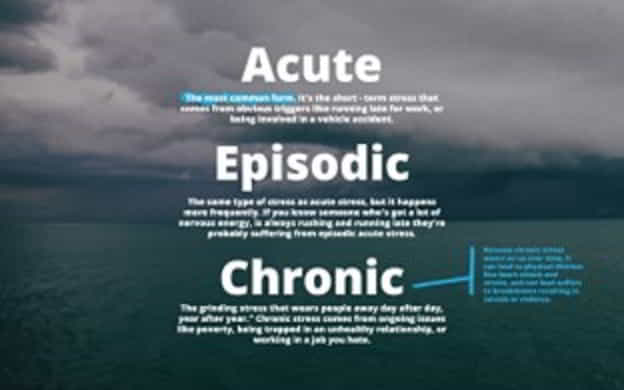
What are main elements of stress
Stress can be categorised in a number of areas acute, episodic and chronic. There are many more and different philosophies of stress. There are also environmental, postural, emotional, dental and nutritional. Some sceptics might say stress is a great business to be in. The more of an issue, like climate change, the more money there is to be made in the business of stress and practically every living being on the planet will be suffering from stress of sort or other.
The key point is if the body produces reactions that we know as stress then it must be a natural thing and in moderation cannot be bad for us. Therefore, extreme stresses need to be identified and managed but what is the degree of stress that we are willing to put up with. I guess it’s like pain, some people have a greater tolerance to pain than others.
Click on any of the tabs on the right to see more information

Acute stress: You know the feeling when you’re behind on a seemingly all-important deadline and then you get a call from your child’s school asking you to come by or you barely miss a serious car accident.
Your heart might race and your blood pressure might rise. Your sense of emergency might trigger a migraine or even chest pain.
Other possible symptoms include irritability, anxiety, sadness, headaches, back pain, and gut problems. These may appear for a short time and subside when the stress eases.
Our minds extend acute stress. A recent argument may replay in your mind, keeping you up at night. Or you might keep worrying about the future, a deadline ahead. You might benefit from learning techniques to calm your mind, but stress isn’t interfering with your relationships or career.
Coping mechanism; the scientist says the example given is acute stress, but in reality, this is life and happens everyday to most people. If you find yourself getting stressed out over everyday issues you need to take a step back and ask yourself why. Why am I allowing this to happen, nobody is forcing me to be stressed it’s me? How can I control this emotion?
Top Tips:
- Stop for a minute, say nothing. Stand up and walk outside. Take some deep breaths. Breath through your mouth out through your nose. Look around you and smile and say S**t happens to everyone.
- Even the most positive person can get bombarded by negative life issues. Imagine holding a visible bat and stand up and pretend to knock it away, say no you’re not upsetting me today.
- Upon feeling the emotions well up. Stop, take a deep breath and repeat; don’t sweat the small stuff nobody has died the planet is still moving. Take control of your emotions

Some people experience these mini-crises regularly and live in a state of tension. They may be taking on too much or simply be overburdened by their lives. If you tend to worry, your body will be tense or angry. The symptoms are similar but occur more often and accumulate.
Maybe your company is poorly managed and your boss is stressed out, passing along emergencies to you. Those tight deadlines keep cropping up.
In modern life, we often can’t take big, immediate actions to solve our problems. Instead, we can take small steps that build up over time.
You might need to spend more time getting physical exercise while rethinking your finances in case you need to quit. You might need the help of a therapist to change your circumstances or your responses to them.
Over time, a pattern of episodic acute stress can wear away at your relationships and work.
That risk is greater if you turn to unhealthy coping strategies like binge drinking, overeating, or clinging to bad relationships. Many people also slowly give up pursuing pleasurable activities or meaningful goals.
If poorly managed, episodic acute stress can contribute to serious illnesses like heart disease or clinical depression.
Coping mechanism; There are so many situations that can arrive and need different actions for each situation. If its at work, take the problem home and when you calm think through how you can stop the firefighting and bad management and then go back in the next day and discuss it. It if doesn’t work get another job.
Top Tips:
- Life’s issues hit us every day. Sometime its like been in a boxing ring with Mike Tyson, we know he is going to punch us but we have to learn to duck and weave, it’s a challenge. We probably can anticipate the majority of stressful situations coming our way. Therefore, we need to develop coping strategies.
- Taking personal time out when calm settled to think through your stressful situations and review how you would deal with it under different circumstances
- Take up Yoga and during the day in your break find a quiet corner and put your headset in and listen to your favourite music, recharge your brain and get ready for the next challenge
- Talk to others about it
- Think the third person; how would someone else have managed that scenario
- Image its your best friend who came to you with the same problem what guidance would you give.

This is the grinding stress that wears us down over the years. It arises from serious life problems that may be fundamentally beyond our control: poverty, war, or racism. The demands are unrelenting and you don’t know when they will stop. You get by day by day.
If you had a traumatic childhood, you may experience life as chronically stressful even when the surface appears okay. You believe you are perpetually threatened by poverty or illness even when this is untrue.
Whether the cause lies in your mindset or difficult circumstances, many people stop fighting for change and begin to accommodate chronic stress. It is important to get all the help you can and not blame yourself — blame will only grind you down further. Chronic stress feeds chronic and acute serious illness.
How can you actually use this information? When you’re overwhelmed, making distinctions — how bad is it really? — may feel impossible or unsympathetic. But distinguishing between these three types of stress will help you see your own circumstances clearly. Are you overreacting, seeing a temporary situation as permanent? Or have you been ignoring the signs for years? Again, blame won’t help. Knowing the three types should also help you find perspective and feel more compassion for other people who are under stress.
Coping mechanism:
Remember, in the main humans are very robust and resilient and we can cope with huge amounts in our life. The way to deal with a multitude of issues that cause Chronic stress is to firstly sit down with someone and map out the issues, feelings, and character change. Discuss with a life coach or counsellor and pull apart the issues. Remember; how do you eat an elephant- one piece at a time.
Fixing small issues first and batting them away as they arise helps people tackle the bigger issues.

What other types of stress are there
There are more stress indicators; Environmental stress, Postural stresses, Emotional stress, Dental stress, Nutritional stress
Click on any of the tabs on the right to see more information

We’re exposed to tens of thousands of chemicals in food, clothing, furniture and personal care products,” says Dr Ron Ehrlich, author of A Life Less Stressed: The Five Pillars of Health and Wellness.
“In addition, electromagnetic radiation from mobile phones, WiFi and Bluetooth have been classified by the World Health Organisation as a Class 2b carcinogen, with the potential to cause cancer.”
So choose the products you use day to day carefully and you can potentially reduce environmental stresses by 80 to 90 per cent, says Dr Ehrlich.

The technological revolution has drastically reduced how much we move day to day.
“Sitting is the new smoking,” says Dr Ehrlich. “And people often spend a lot of time looking down at their phones and that puts enormous strain on our neck, shoulders and spine.”
Our posture can also be under stress when we sleep. Avoid sleeping on your stomach as it’s the worst position for the head, neck, jaw, muscles, airways and digestion.

This type of stress runs down our immune system and damages the ability to think logically.
“We don’t have control over everything, but we have some control over how we react to things,” says Dr Ehrlich.
“Becoming aware of the effects that emotional stress have on our health is a motivator to take control over how we react.”
Nurturing relationships and practising gratitude have also been shown to have positive effects on managing emotional stress.

The shape and size of your mouth determines the shape and size of your upper airway.
A narrow airway can lead to shallow mouth breathing and upper respiratory infections like enlarged tonsils, asthma, allergies. “The mouth is the site of the two most common infections – tooth decay and gum disease – and gum disease is linked to diseases like heart disease, cardiovascular disease, diabetes and cancer,” says Dr Ehrlich.

“The foundation of our diet has become carbohydrates that elevate blood sugar and man-made oils that are inflammatory,” says Dr Ehrlich. “We also see an over-use of factory-farmed meats and the use of additives, preservatives, herbicides, antibiotics and pesticides. Too much processed food and over-eating are all nutritional stresses.”
Focusing on whole foods, minimising carbohydrates and drinking water help ease nutritional stress.
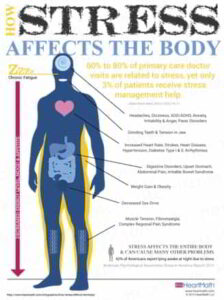
How does stress impact on our body?
Here we look at how stress of all kinds moderate or extreme effects the body and therefore why it is so important to take control of our emotions.
Stress has a profound impact on a number of areas of the body, as you will see from the tabs below.
Click on any of the tabs on the right to see more information

Stress can serve an important purpose and can even help you survive. For our ancestors, stress was a helpful motivator for survival, allowing them to avoid real physical threats. That’s because it makes your body think it’s in danger, and triggers that “fight-or-flight” survival mode.
Fight-or-flight mode refers to all the chemical changes that go on in your body to get it ready for physical action. In some cases, these changes can also make you freeze.
While this stress response can still help us survive dangerous situations, it’s not always an accurate response and it’s usually caused by something that’s not actually life-threatening. That’s because our brains can’t differentiate between something that’s a real threat and something that’s a perceived threat.

When you encounter a stressor — whether it’s an angry bear or an unreasonable deadline — a chain of events kicks off in your brain. First, the amygdala, an area of your brain that processes emotion, gets information about the stressor through your senses. If it interprets that information as something threatening or dangerous, it sends a signal to your brain’s command centre, known as the hypothalamus.
The hypothalamus connects to the rest of your body through the autonomic nervous system. This controls automatic functions like your heartbeat and breathing through two different systems: the sympathetic and the parasympathetic.
The sympathetic nervous system triggers the fight-or-flight response, giving you the energy you need to respond to a threat. The parasympathetic does the opposite; it allows your body to go into “rest and digest” mode so that you can feel calm when things are safe.
When your hypothalamus gets a signal from your amygdala that you’re in danger, it sends signals to the adrenal glands and activates your sympathetic nervous system. The adrenals pump out adrenaline, causing your heart to beat faster, forcing more blood into your muscles and organs.
Your breathing might also quicken, and your senses might get sharper. Your body will also release sugar into your bloodstream, sending energy to all different parts.
Next, the hypothalamus activates a network called the HPA axis, which is made up of the hypothalamus, pituitary, and adrenals. This can cause these areas to release more stress hormones, including cortisol, which forces your body to stay wired and alert.

Musculoskeletal system
Short term: Your muscles tense up suddenly and then release when the stressor is gone.
Long term: If your muscles are always tense, you can develop problems like tension headaches and migraines, as well as other chronic pains.
Respiratory system
Short term: You breathe harder and faster, and can even hyperventilate, which can cause panic attacks in some people.
Long term: If you have asthma or emphysema, breathing hard can make it difficult to get enough oxygen.
Cardiovascular system
Short term: Your heart beats harder and faster and your blood vessels dilate, pushing more blood into your large muscles and raising your blood pressure.
Long term: Consistently elevated heart rate, blood pressure, and stress hormones can increase your odds of heart attack, stroke, and hypertension. These can also affect cholesterol levels and cause inflammation in your circulatory system.
Endocrine system
Short term: Stress hormones like adrenaline and cortisol give your body energy to either fight or run away from a stressor. Your liver also produces more blood sugar to give your body energy.
Long term: Some people don’t reabsorb the extra blood sugar that their liver pumps out, and they may be more likely to develop type 2 diabetes. Overexposure to cortisol can lead to thyroid problems and affect your ability to think clearly. It can also cause excess abdominal fat.
In men, chronic stress can also affect sperm and testosterone production, and cause erectile dysfunction and infections in the testes, prostate, or urethra. In women, chronic stress can worsen PMS, cause changes in the menstrual cycle, and missed periods. It can also aggravate symptoms of menopause and decrease sexual desire.
Gastrointestinal system
Short term: You may feel butterflies in your stomach, pain, or nausea, or might even vomit. Your appetite can change and you can have diarrhoea, constipation, or heartburn.
Long term: Stress can lead to severe chronic pain and changes in your eating habits. You can also develop acid reflux.

How do we control stress - top tips
There are thousands of things we can do to avoid stress. But each stress situation has a different solution. The key is if you feel stressed about anything or everything then it’s not the situation but how you deal with it. It’s you and you need to take a step back and really analyse yourself. Here are few generic tips to help.
• Eat and drink to optimize your health. ...
• Exercise regularly. ...
• Stop using tobacco and nicotine products. ...
• Study and practice relaxation techniques. ...
• Reduce triggers of stress. ...
• Examine your values and live by them. ...
• Assert yourself. ...
• Set realistic goals and expectations.
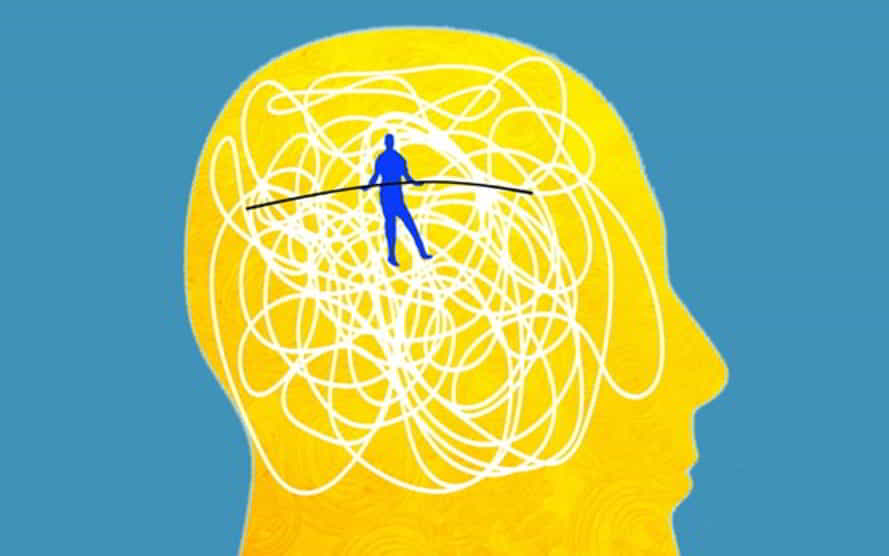
It’s all in the mind - or is it?
Well, it is really but it’s not. Psychosomatic connectors make it a joined-up thing. If you read early about how stress impacts on the body in a number of ways and also your environment/nutrition impacts on the body which in turn causes stress. So, if you have a hi pressured role in the city with the smog, grabbing quick bits and then going to the bar afterwards and then eating at 10pm and then to bed all these things have an impact on stress and creates an unstable environment. When we are in our twenties, we are invincible but when we get into our forties it starts to take its toll.
Carry out a lifestyle questionnaire will enable you to see how much stress you are putting your body and mind under. This will enable you to take actions to reduce some of the stress areas. But,
Top Tip: which comes first chicken or egg. You need to make a list of each area and then score it out of 10 tackle some of the smaller easily achievable things first, they are small but it gets you into changing your lifestyle, then tackle some of the bigger one but don’t go crazy or you will give up.

I am very calm - it’s others that P… me off
I have PMA [ positive mental attitude] I am invincible, yeh right until you step out of the house and the bloke in front of you nicks your parking space at the train station. Then your PMA bubble is under attack then the bubble bursts and your mood shifts.
Many people work so hard to develop a PMA and develop inner peace and tranquillity. They reduce their stress levels down and feel that they have reached their Nirvana and then Boom!!! Your mobile phone breaks and you have to contact a mobile phone customer service.
The good thing is you are not alone. There are millions of Positive people out there trying to do the same. They are generally cup half full people but there is also the opposite the cup half empty. These people hate you for been so positive and smiling whilst they see the dark side of life.
Click on any of the tabs on the right to see more information

We pass them on the railway platform or at the bus stop
Ever sat on bus or train and looked at the commuters and see the expression or lack of expression on their faces. Many people spend their entire lives unhappy or miserable. Having said that cup half empty people are not all miserable. The world would not be a great place if we were all the same. Plus, there are many jobs and lifestyles that cup half empty people fit into that would not suit cup half full.
The two characters often have different attitudes towards everything, even speak a different language, well interpret different words. Often when different character speaks the other type hears and interprets different things.

• Accept that everyone is the same and will have a different view
• Accept some people are out to burst your bubble and the best way to deal with it is avoid it.
• Smile when you meet the cup half full/empty and if you don’t like what you hear close yourself off to it
• If you live or work in an environment where it doesn’t suit you, plan an escape to an environment that does suit you.
• If you are in a position to rationally talk things through try to show others the type of person, they are but in a positive way. But remember if you are an opposite, it might not come across well.
• The real key is to close your mind to the opposite character
• Use YouDriveHealth to educate
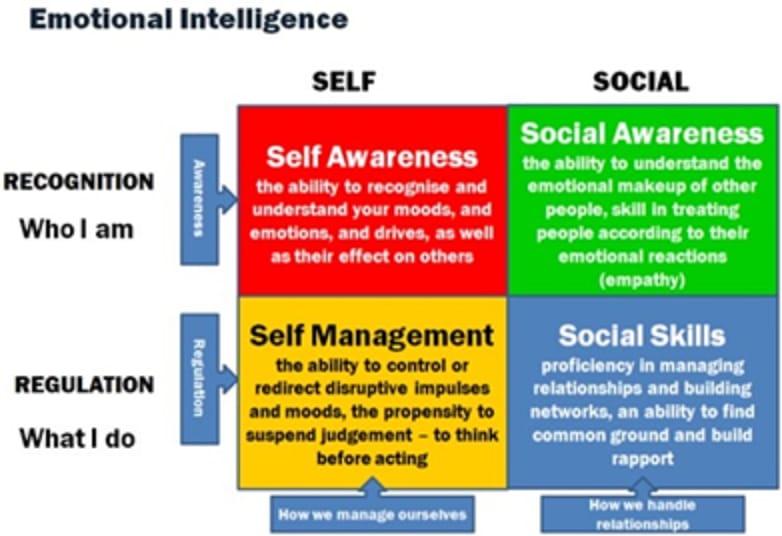
It’s all to do with emotional Intelligence and taking control of the grey matter
So what does emotional Intelligence mean?
It is the ability to understand, use, and manage your own emotions.
Taking control of the grey matter. We cover emotional intelligence in MindDrive and PersonalityDrive, specifically in this Drive we concentrate on why having emotional intelligence helps you to manage stress.
Taking control of what I think and feel – taking control of the brain
Some would say that is easier said than done. As an Icon if we consider that by 2026 half the UK will be classified as obese and in the main this is due to lifestyle, eating and drinking too much and not exercising. If we cannot even control our own food and lifestyle intake, how can we be expected to control our brains.
If you can lose weight and get healthy it’s called Willpower!! it’s the same with the brain. You can control your brain if you wanted to and stop the stress. There are hundreds of books written by experts on how to take control of your brain and make it do what you want rather than react to emotions.
What are the main things emotional intelligence will do to help me manage my stress?
• Learn to be more self-aware. Take a good look in the mirror and see yourself GOOD and BAD bits and smile, say this; That’s me. I need to build my strong bits and get rid of my bad bits.
• Self-regulation, when to shout; STOP that is enough with the negative thought.
• Motivation to not allow yourself to feel the way you do.
• Self-management is all about controlling every move and action in your body and mind and not being over influenced by external social media and quick fix solutions.
• Social awareness, seeing yourself as who you are not what you think others want you to be.
• Relationship management with people around you, understanding them and things you don’t like letting them bounce off you like you are surrounded by a forcefield.
Creating that Habit
As babies we learn to crawl and walk. We learn to know when to go to the toilet, we learn to start to control our emotions. As teens we learn how to moderate and adjust our behaviour to fit and not to cry when we don’t get our own way, we learn that hitting someone does not solve the problem or win an argument. These are all habits we form. We also form bad habits by eating and drinking too much, becoming lazy and when things don’t go our way we go into a meltdown.
As humans we can all learn new habit over the top of old or bad habits.
For visitors
Why don't you join us?
You can register to join us as a member, when you’ll be able to download our stuff and comment, or as a YouDriver when you’ll also be able to check your health and set up your own action plans to make some improvements. If you’ve already registered, sign in below. Or let us know what you think.
What does stress do to your body
Stress is a natural body function and we can’t do without it in short bursts
Spurts of acute stress (known as “eustress” in research, if you like learning new words) can increase your memory, concentration and more. Learning to embrace stress is beneficial, so start by watching this video. If you’re actually reading this, you REALLY care about good stress 👏 and there is further reading below.
Stress is a natural body function and we can’t do without it in short bursts

Next Steps
It doesn’t matter what stage you’re at – it’s important to be the best you can be. At the end of the day it’s about taking personal responsibility – You Drive!
It’s really your choice. You can find out more information about the subject, or see other institutions that can help by going to Support. There you will find organisations, training, coaching, self-help courses and other items to support your personal change. We have also started developing a panel of experts to provide info, advice, help and support.
Get Support
There are times when you need some help to meet your aims – a helping hand. That might be an organisation that can provide you with some help, some specialised information, a particular book or tool to help, or just getting some background reading material.
We have a lot of items which appear on our Drives and other pages, which you can go to by clicking on the picture or link. Some contain affiliate links and we may receive a tiny commission for purchases made through these links.
If you know of anything which could help you or our other visitors then please click the button on the right, which will take you to a Contacts page where you contact us.
Experts
We are compiling a list of experts who can provide advice, help or specialised services. You will be able to access these experts from anywhere on our site you see our ‘Experts’ symbol. Click the green E to see what our Experts list will look like, with a couple of imaginary ‘experts’ added!
More Information
Scroll down to see more information on this Drive.
If you register you can also download reports, white papers, quizzes and other collaterals. We will never ask you for any financial information, and we’ll only send you the information you want. You can register for our site either above or in the footer below. You can provide your own questions and experiences in order to help other members. We only moderate for spam and inflammatory language – see our moderation policy.
If you’ve found this interesting, then please share it on social media. Choose your network!
More information
Master Your Emotions
A Practical Guide to Overcome Negativity and Better Manage Your Feelings: 1 (Mastery Series)
Have you ever thought…
…about your thoughts?
Do you have a bias toward the negative?
Go to Amazon
A Life Less Stressed
The Five Pillars of Health and Wellness – Paperback
Life has never been more stressful. It is no coincidence that chronic degenerative disorders such as cancer, heart disease, autoimmune illnesses, and mental-health conditions are on the rise. But if we want to tackle them, we need to look beyond their symptoms. That is the message of dentist and health advocate Dr Ron Ehrlich.
Managing Stress – Mindfulness, Meditation & Reflection For Busy People
A how-to guide for managing stress through mindfulness, meditation and reflection in work, family & everyday life.
Do you live a hectic life? Are you feeling stressed over family, friends, relationships, work or one of the many thousands of things that place pressure on you?
The Mental Toughness Handbook:
A Step-By-Step Guide to Facing Life’s Challenges, Managing Negative Emotions, and Overcoming Adversity with Courage and Poise
Bravely Endure Hardship, Perform Under Pressure, and Overcome Challenges More Easily Than You Ever Thought Possible!
It’s All In The Mind, You Know!
Chronic overwhelm is one of the biggest problems of our age. Stress, ill health, absenteeism from work and deteriorating relationships seem to be inexorably on the rise.
The metaphors in this book point to the solution to these problems and more. They will not provide tips, techniques or strategies, but reveal a simple truth about how the human experience works.
Eliminate Negative Thinking
How to Overcome Negativity, Control Your Thoughts, And Stop Overthinking. Shift Your Focus into Positive Thinking, Self-Acceptance, And Radical Self Love
If You Want To Break Free From Negative Thought Patterns, Stop Worrying And Learn To Think Positive, Here’s The Right Book For You!
The Little Book of Emotional Intelligence
How to Flourish in a Crazy World
The Little Book of Emotional Intelligence is an immediate, outcome-focused primer on the important topic of EQ, which provides practical, no-nonsense life advice and takes a sideways look at a world which is complicated and overwhelming at times.
Squishy Stress Balls with Gel Beads
Jumbo Size (Colorful) – Anti-Stress ADHD Anxiety Relief Sensory Toy Fidget Toys for Kids and Adults
Calming Sensory Fidget Toy – These fun, squeezable gel stress balls contain soft jelly beads that can be squished, squeezed, and pulled to help relieve stress or anxiety, promote focus and calmness, and help reduce tension.
Anxiety UK specialise in managing anxiety and have help on hand with specialists online.
Psycom explain the difference between stress and anxiety
WebMD have tips for reducing stress






















